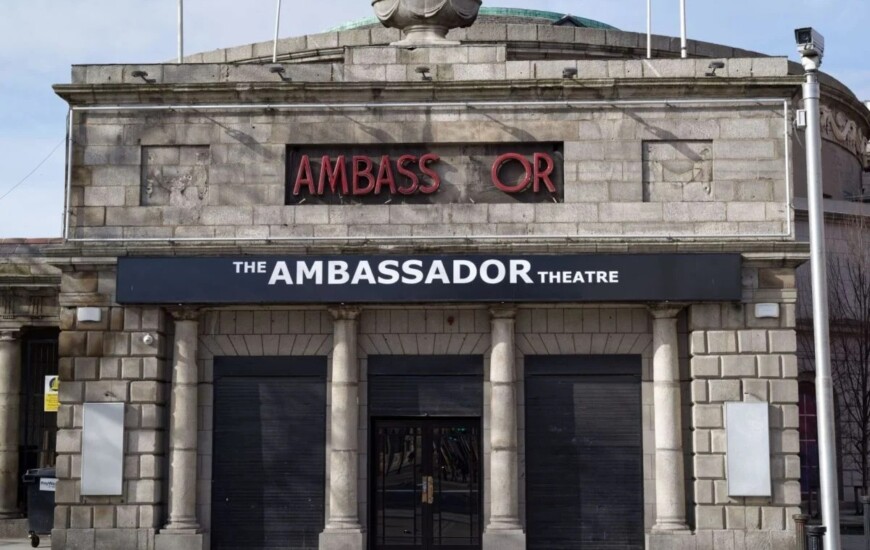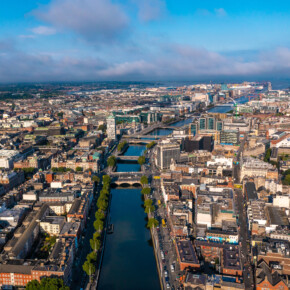Proposed ring of steel around Ambassador Theatre a “sad state of affairs”
Mike Finnerty 07 Feb 2024
A proposal to erect a ring of steel around the Ambassador Theatre has been criticised by local TDs and civic groups.
First reported in the Irish Times, planning permission has been sought by Millennium Theatre Company, the company that operates the venue, to surround the premises with steel railings.
The railings, planned to be up to 1.7m in height, look to deter “fires, vandalism, blood, urine, vomit and human excrement.”
The application was lodged with Dublin City Council, but the move is facing fierce opposition from local elected representatives and civic groups.
Dublin Central and Social Democrats TD Gary Gannon called the move “a sad state of affairs.”
“It is a sad state of affairs when the operators of this historic landmark feel the need to surround the venue with a permanent ring of steel to keep patrons safe and protect the building from damage.”
“We are talking about an iconic building that dates back to 1764 and overlooks O’Connell Street, our capital’s main thoroughfare. I am completely opposed to plans to fence off this important cultural space, which has been allowed to fall into a state of neglect over the years,” he said.
Railings were previously erected around the building up until 1953 and were subsequently removed.
The Ambassador Venue served as a cinema up until 1999, became a concert venue until 2008 and staged exhibits such as the Bodies exhibit and a Lego exhibit.
The Ambassador Theatre has sat unused since the outbreak of the Covid-19 pandemic in 2020, and Gannon said that the venue sitting in a disused state feeds into the bigger issue of dereliction in Dublin City Centre.
“Yet again, I find myself asking for Dáil time to allow for urgent statements on Dublin city centre. We need a multi-agency task force, led by the Taoiseach, to discuss how we can make the city safer.”
“This means tackling anti-social behaviour, dealing with dereliction and bringing vacant buildings back into use.
“We need to protect our built heritage, such as the Ambassador Theatre, and ensure that the ongoing decline of our once-proud city is stopped in its tracks.”
Fellow Dublin Central TD Mary Lou McDonald said the move was “bad news for Dublin.”
The Sinn Féin leader said the move was “the latest evidence of Government failure to provide Garda presence and resources to the city.”
“They need to remember that communities live in the inner city; they deserve to be safe.”
Labour’s Aodhán Ó Ríordáin, TD for Dublin Bay North, said the proposal is “short-sighted and wrong-headed.”
“This isn’t the Dublin we want or need,” he wrote.
“More steel railings makes the city feel more unwelcoming & more unsafe.”
The Dublin Civic Trust said “the Ambassador is the great Pantheon-like round room that gave the Rotunda its name. Built in 1764-67, it is remarkably intact behind disfiguring advertising. Railing in the building would be a retrograde step.”
They said that putting the building back into use “would be a good start.”
Making the Ambassador a functional building again, in their view, would create a “high-quality new public realm with good lighting and it would encourage more people to linger in and use the space, creating passive surveillance.”
Graham Hickey of the Dublin Civic Trust questioned the installation of rails.
The submission to Dublin City Council mentions that rails were part of the structure up until the 1950s and “added to the character” of the building, but Hickey told the Irish Times this was based on a “dubious historical precedent.”
He said that arguments about threats to safety and antisocial behaviour around the area served as “no justification” for the proposed railing.
In recent weeks, Dublin City Council attracted criticism for closing off the nearby Harbour Court for fear of attracting anti-social behaviour.
The decision, made at the January meeting of Dublin City Council, was criticised by Green Party Councillor Janet Horner.
Horner, who represents the nearby North Inner City constituency, said the decision was “regressive” and demonstrates a “lack of vision and ambition” in tackling Dublin’s social issues by Dublin City Council.











